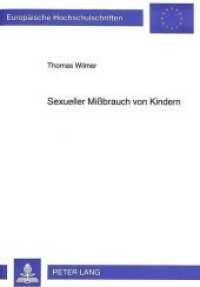- ホーム
- > 洋書
- > ドイツ書
- > Humanities, Arts & Music
- > Humanities
- > general surveys
Description
(Text)
Aus dem Inhalt
Ulf Harendarski: Zum Zeichenbegriff in Brandoms Expressiver Vernunft
Summary. This is an article on Robert B. Brandom's philosophical and linguistic pragmatism as expressed in his Making It Explicit asking whether it can be connected to linguistic semiotics thus contributing to more general semiotics. For this reason the essay shall elaborate on Brandom's underlying but rather implicit communication model which - according to critics - consists of circular argumentation. The reproach of Brandom's critics is that language can not be learned without a preset of mental concepts missing in Brandom's inferentialism, which is merely based on proposition, assertion, reason and (non-mental) concept. Finally, this essay ends with the idea that a further step in theory is needed to analyse linguistic attributions of intentionality without attributing a propositional core at the same time.
Zusammenfassung. Der philosophisch-linguistische Pragmatismus der Expressiven Vernunft Robert B. Brandoms wird skizziert, auf seine Anschlussfähigkeit zu semiotischen Fragestellungen untersucht und die offenkundige Möglichkeit geprüft, ihn als Beitrag zu einer allgemeinen Semiotik zu verstehen. Dafür wird das von Brandom gesetzte, aber nicht eigens festgelegte Kommunikationsmodell herausgearbeitet und schließlich der Ansatz mit einem Zirkelvorwurf konfrontiert. Denn Sprache lasse sich nicht - so die Kritik - ohne vorausgesetzte mentale Konzepte erlernen, auf die Brandoms auf Proposition, Behauptung, Urteil und Begriff gestützter Inferentialismus aber verzichte. Schließlich wird im letzten Abschnitt die Idee der Intentionalitätszuschreibung aufgenommen und so erweitert, dass das Modell auch sprachliche Attribuierungen von Intentionalität erlaubt, die keinen propositionalen Kern enthalten oder die keinen solchen artikulieren.
Anne Reichold: What is it like to be a discursive being? Perspektivität und Ich-du-Sozialität bei Robert Brandom
Summary. In this article it is argued that Brandom's conception of linguistic practice in terms of an I-thou-sociality not only articulates a normative and social, but also an embodied conception of persons. Though Brandom focuses on the normative and social character of linguistic practice and its agents, in the article it is shown that linguistic practice in Brandom's normative terms of commitment and entitlement involves a spatiotemporal distinction between agents or persons that is not made explicit by Brandom. Spatio-temporal individuation of persons thus is not conceptualized as prior, or independent to linguistic practice and ascription of normative status, but it is a genuine feature of linguistic activity. The conception of I-thou-sociality that articulates a symmetrical pattern of communicative action, as well as Brandom's inferential account of objectivity in terms of de dicto and de re contexts, involve reference to spatio-temporal categories to distinguish persons and contexts from one another. Thus Brandom's account of I-thou-sociality articulates not only the concept of linguistic persons as genuinely social and normative beings but, within this normative practice, also as embodied beings located, and locating themselves, in a spatio-temporal environment.
Zusammenfassung. Im vorliegenden Beitrag soll gezeigt werden, dass mit der perspektivischen Konstruktion linguistischer Praxis als Ich-du-Sozialität bei Brandom zugleich eine raumzeitliche Konzeption diskursiver Personen artikuliert wird. Brandom selbst konzentriert sich bei der Explikation des Selbstverständnisses diskursiver Wesen vor allem auf die Sozialität und Perspektivität diskursiver Praxis. Im vorliegenden Beitrag soll der Fokus der Analyse im Ausgang von der Ich-du-Sozialität auf das in der diskursiven Praxis vorausgesetzte und pragmatisch in Anspruch genommene raumzeitliche Bezugssystem gelegt werden.








